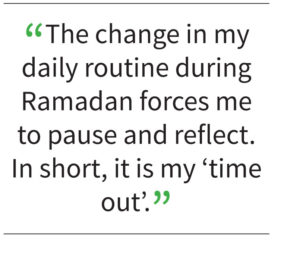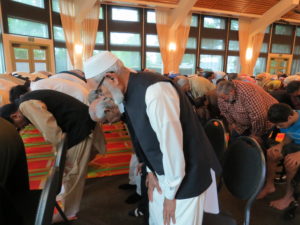Making Corruption History – Cakap Kosong Je ‘Jib!
M. Bakri Musa
[Former Prime Minister Najib Razak, while not yet gone, is now awaiting criminal charges that could land him in jail for decades. There is little benefit in expending ink on him now except for some weekend laughs and as a mental exercise in "what could have been." Here is what I wrote on him then while he was flying high.]
.
In San Francisco recently (September 2009), Prime Minister Najib confidently declared “to make corruption part of Malaysia’s past, not its future.” The man’s delusion never ceases to amaze me. The reality is of course far different; corruption defines the Najib Administration.
Nonetheless if Najib is serious, then he should heed Tengku Razaleigh’s call for Najib to declare his assets. Otherwise it would be, to put it bluntly in the vernacular, “Cakap kosong je ‘Jib!” (Empty talk only!)
Tengku Razaleigh’s suggestion, if implemented, would do far more good than all of Najib’s lofty declarations of “changing organizational as well as business cultures” or creating “a new governance and integrity minister” and “elevating the anti-corruption agency.” Malaysians have heard all those ad nauseum, not only from Najib but also his predecessors.
If after doing what Tengku Razaleigh had suggested Najib still aspires higher, he could begin by getting rid of those tainted individuals in his administration. Then if he is really committed to clean and effective governance, he should select only those with unquestioned integrity and solid accomplishments to be his new ministers and advisors.
As Najib is slow to grasp concepts, let me elaborate on those three simple suggestions.
Consider asset declaration. Najib does not need yet another highly-paid consultant advising him how to do it. There are plenty of effective models out there, including one recommended by the OECD. The simplest is the one used by American officials including the president, cabinet secretaries, and Supreme Court judges. It covers their spouses and all dependent children.
Here is President Obama’s, available publicly at:
docstoc.com/docs/156786412/Obama-Financial-Disclosure. The simple eight-page report lists his assets and income, transactions during the year, gifts received (he had none), liabilities (his home mortgage), and contracts he is a party to (his old faculty appointment).
Simple yet effective! As the declaration is filed annually, citizens could tract any sudden ballooning of assets, income, or extra-generous gifts that could prompt further enquiry, as well as monitor contracts and activities that could pose as potential conflict of interest.
Obama and his senior officials go further; they release their full income tax returns annually.
If Najib were to do likewise, rumors of his wife buying million-ringgit rings and getting extravagant gifts would not have arisen, indeed they were baseless.
If Najib’s ministers were also to declare their assets, then we would not have the silly specter of a cabinet minister feigning ignorance of her husband’s quarter-billion ringgit government-funded business, as Shahrizat tried to do recently. The pathetic part was that she truly believed that the public would buy her swiftly-concocted story.
Beyond publicly declaring his assets, if Najib aspires for a clean administration, then he should remove those tainted individuals in his administration. Since Najib is blind to reality, I will help him identify such proven shady characters.
The most glaring is Isa Samad, former Negri Sembilan Chief Minister. Dispensing with his lackluster tenure as the chief executive of that state, the man was found guilty of “money politics,” UMNO’s euphemism for plain ugly corruption. Meaning, he is corrupt even by UMNO’s lax standards, assuming the party has any!
In any system with even a semblance of integrity, slimy characters like Isa Samad would have been jailed. In China, they would be executed. Yet Najib appointed Isa to helm the billion- ringgit Felda Global Holdings, a GLC. One wonders why Najib is so enamored with this character. The more intriguing question is why the powerful hold Isa has on Najib?
Then there is Ali Rustam, also a former Chief Minister (Malacca). Like Isa, Ali too was found guilty of money politics. At least voters in his state were wise enough to boot him out. Now Ali is eyeing for the UMNO Vice-Presidency, as is Isa. Watch it, Najib will also do an Isa on Ali, that is, appoint him to a senior lucrative position, making a mockery of Najib’s aim of making corruption history.
Then after getting rid of the Isa Samads and Ali Rustams Najib still harbors even higher aspirations, like wanting a crisp and efficient administration, then he could entice capable Malaysians to join his team.
I suggest co-opting Keadilan’s Rafizi Ramli. This bright young man has done more than anyone else to heighten public consciousness of corruption at high places. Rafizi shamed the anti-corruption agency. Appointing Rafizi would also go a long way towards a “unity” government. Only the likes of Shahrizat would not welcome his appointment.
At the very least Rafizi’s appointment would significantly lower the average age of Najib’s cabinet as well as drastically elevate its collective IQ!
At the other end of the experience spectrum is Tengku Razaleigh. He is from Najib’s own party too. If Najib is deeply serious about and truly committed to memperkasakan ekonomi Melayu (enhancing Malay economy) as he asserted recently, well, the Tengku has been there and done that, and remarkably well too! Look at Petronas and Pernas. Malaysia’s finances were robust during his tenure as Finance Minister.
Yes, at one time he helmed the once powerful Bank Bumiputra, now long gone. If Tengku’s detractors want to taint him with that scandal, remember this. Tengku Razaleigh is one of the few if not only public figures to have successfully sued for libel the venerable Financial Timeswhen it tried to implicate him.
Co-opting Tengku Razaleigh would give the Najib Administration some adult supervision. Better yet, Najib should seize the opportunity and take a sabbatical, just like what Lee Kuan Yew once did. Take a temporary leave from UMNO and Malaysia; learn about the real world beyond government. Najib would learn that there is a vast other universe out there not dependent on public paychecks or political patronages.
At another speech during his recent San Francisco trip, Najib chided his critics especially those residing abroad who “criticize the country but they do not have any idea on how to contribute to the country.”
Najib is not only slow in grasping concepts but he is also not a careful reader. We do not criticize Malaysia, only his inept leadership. Nonetheless since Najib has asked for specific ideas, here is one.
Take an extended sabbatical. Let someone like Tengku Razaleigh take over. Three or four years hence, in time for the next election, resume your prime ministership. Meanwhile learn as much as possible about the much bigger and considerably more wonderful world beyond UMNO. You will be a more effective leader for that, and Malaysia would be a much better country, both while you were gone and after you return.


 In today’s harried and hurried world, it is easy to be caught up in the maelstrom. The change in my daily routine during Ramadan forces me to pause and reflect. In short, it is my “time out.”
In today’s harried and hurried world, it is easy to be caught up in the maelstrom. The change in my daily routine during Ramadan forces me to pause and reflect. In short, it is my “time out.” Experts also tell us that after a few days of fasting we begin breaking down our fat cells. The weight-reduction aspect aside, that invigorates our stem cells, especially those of our intestines. This in turn enhances healing and disease prevention, as well as mitigates the effects of aging. No surprise that experts now advocate fast-mimicking diets.
Experts also tell us that after a few days of fasting we begin breaking down our fat cells. The weight-reduction aspect aside, that invigorates our stem cells, especially those of our intestines. This in turn enhances healing and disease prevention, as well as mitigates the effects of aging. No surprise that experts now advocate fast-mimicking diets.


